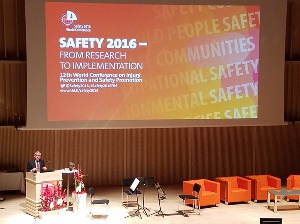 Dr Adnan Hyder- Johns Hopkins University delivering closing reflections of the conference
Dr Adnan Hyder- Johns Hopkins University delivering closing reflections of the conference
By Samuel Hinneh, Courtesy: ICFJ-WHO Safety 2016 Reporting Fellowship Program
One of the key messages derived from the gathering of global injury prevention and safety professionals at the Safety 2016 World Conference in Finland is research implementation. It may seemed easy to do, but it is a huge bottleneck to preventing injuries around the world. Recognising the problem, the conference theme, ‘From Research to Implementation’ seeks to provide evidence based practice to tackle the global burden.
The burden of injuries has become a global public health priority. As a result, some of the world’s leading injury prevention and safety researchers, practitioners, as well as policy makers have identified the critical needs to generate evidence based approach implementation of interventions and ensuring use of existing evidence for policy and practice in road safety.
As the Safety 2016 World Conference-12th World Conference on Injury Prevention and Safety Promotion, took centre stage at a beautiful city of Tampere, Finland, from September 18-21, 2016, many experts shared their views on research implementation in road safety, particularly in Africa, especially Ghana.
Dr Etienne Krug, the Director of the World Health Organisation (WHO) Department for the Management of Non-communicable Diseases, Disability, Violence and Injury Prevention states that it is crucial to talk about research in Africa because it is not necessarily so that what has worked in Europe will work in Africa.
"In Africa there are cultural issues, issues around different types of vehicles and infrastructure. Largely, it will work but there is the need to look at those specificities and make sure that the research results are used-because they are published in scientific papers but often not the basis for solid policy making and that is what we want to discussed," Dr Krug emphasises.
Data from the World Health Organisation (WHO) indicates that road traffic injuries claim more than 1.2 million lives each year posing a huge impact on health and development. It is the number one cause of death among people aged 15-29 years. The highest rate of injury related fatalities occur in Africa.
According to him, there are many efforts to tackle road traffic crash in Africa and that is good because the sustainable development goals have called for a 50% reduction in the number of deaths.
"There are countries like Ethiopia or Ghana looking at their trauma care system for improvement. Mozambique has looked at their data and legislation and worked on a plan of action. South Africa is making improvements also, because the death toll is high there too.
"So there are many countries where efforts are taking place, unfortunately those efforts are good but not enough to tackle the issues at the level we will like to see it, so we need to scale up," Dr Krug says.
Dr Barry Watson, the Chief Executive Officer of the Global Road Safety Partnership (GRSP) believes that as far as road safety is concerned, there are many good approaches to combat road traffic crash, saying, "We have got good evidence around the world about what laws are effective and how to go about enforcing them."
"The challenge is how to make sure that they are implemented well and what countries need to do is to look at the processes that are working well in other countries.
"So particularly from enforcement point of view, is looking at how enforcement uses good data to deploy it and to make sure that the enforcement is done targeting key factors such as drink driving and speeding and making sure that the enforcement starts in a way that people understand that it is about protecting their safety and not catching offenders," says Dr Watson.
He states that African governments need to channel resources into the police service because road policing is as an important activity of protecting communities and therefore the need to devote sufficient resources and equipment for road policing.
Dr Adnan Hyder, Director of the Health Systems Program, and Associate Chair in the Department of International Health, Bloomberg School of Public Health, Johns Hopkins University, points out that a lot of research is being quoted by policy makers, so every policy maker knows that there are more than a million people dying from road safety around the world.
"They are very conscious of the number of people dying in their own countries. So in a sense these numbers are helping us make the case. What we have to do now is to go beyond making the case to a situation where we also show them the specific interventions that they need to implement in order to reduce those death, disability and injuries.
"And that is where I think different types of evidence is very useful. Evidence on cost, cost effectiveness, and effectiveness, these are the three parameters that you need. The other type of evidence that is very useful to help implementation is examples.
"So for example if Ghana wants to do good road safety enforcement and let pretend neighbouring countries have already done it, then it is very helpful to show the example and say look, here is a great practice… examples can be extremely helpful for enforcement," Dr Hyder notes.
According to him, enforcement of legislation would require that legislation on road safety is in order.
"It is important that good legislation has to be in order for good enforcement. The police force have to be encouraged and also their capacity developed to do good enforcement. It is important to do intelligent policing and evident based enforcement which requires training of police and equipment supply," Dr Hyder, who is also the Director of the International Injury Research Unit at the John Hopkins Bloomberg School of Public Health, based in USA.
Kelly Larson, Programme Director, Bloomberg Philanthropies also states that research implementation takes political commitment and resources, adding, "so there is the need to advocate to the government that road traffic crash is a problem, and to solve the problem requires the application of evidence that works."
Dr Sally-Ann Ohene, Disease Prevention and Control Office at the WHO Country Office for Ghana identified poor collaboration between the academia, policy makers and implementers as a challenge to research implementation in Ghana.
"There is the need for research findings to be simplified into key points for policy makers to understand and translate them into policies and enforcement. We really need to find ways we can collaborate to share information that is available so that policy makers can use the information," Dr Ohene says.
Ms Ayikai Poswayo, Programme Director at AMEND, a nongovernmental organization in sub-Saharan Africa which develops, implements, and evaluates evidence-based interventions to reduce the incidence of road traffic injury among the most vulnerable road users, explains that research implementation is not considered as a priority in Ghana.
"If a lot of people recognise road safety as a real priority, then we will give it the attention it needs. Each time road projects develop a setback in Ghana, people always cut off road safety aspect of projects and divert the funds elsewhere, such as to an additional kilometre of road for vehicles forgetting that pedestrians also use that," she notes.
Photo credit: THL/Finland;












